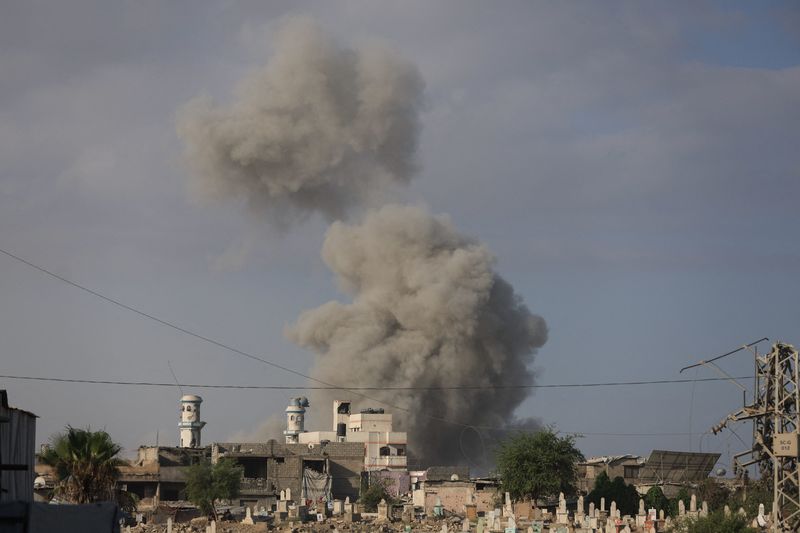Hundreds of UN Staff Pressure Rights Chief to Call Gaza a Genocide, Letter Shows
August 28, 2025, GENEVA – In a bold internal challenge to the United Nations’ cautious stance on the Israel-Hamas conflict, over 500 employees at the Office of the High Commissioner for Human Rights (OHCHR) have urged High Commissioner Volker Türk to publicly label Israel’s actions in Gaza as genocide. The appeal, detailed in a letter sent on August 27 and reviewed by Reuters, represents a significant fracture within the UN’s human rights apparatus, highlighting growing frustration among staff over the organization’s response to the nearly two-year war that has devastated the Palestinian enclave.
The Letter: A Call for Moral and Legal Accountability
The letter, signed by the OHCHR Staff Committee on behalf of more than 500 employees—roughly a quarter of the office’s 2,000 global staff—argues that the “legal criteria for genocide” have been met in Gaza, based on the “scale, scope, and nature of violations” documented there. It invokes the 1948 Genocide Convention, which defines genocide as acts committed with intent to destroy, in whole or in part, a national, ethnic, racial, or religious group.
“OHCHR has a strong legal and moral responsibility to denounce acts of genocide,” the letter states, demanding that Türk take a “clear and public position.” It warns that failing to do so “undermines the credibility of the U.N. and the human rights system itself,” drawing a stark parallel to the international community’s perceived failure to prevent the 1994 Rwandan genocide, which claimed over one million lives.
The staff’s plea comes amid escalating humanitarian crises in Gaza, where Israeli military operations have reportedly led to tens of thousands of deaths, widespread displacement, and famine-like conditions. The letter emphasizes the UN’s duty to speak out against what it describes as an “unfolding genocide,” citing documented atrocities including indiscriminate bombings, blockades on aid, and attacks on civilian infrastructure.
Türk’s Response and Internal Tensions
In his reply, also reviewed by Reuters, Türk acknowledged the letter’s “important concerns” and expressed shared “moral indignation at the horrors we are witnessing” and frustration with the international community’s inability to end the conflict. He urged staff to “remain united as an Office in the face of such adversity,” but stopped short of endorsing the genocide label.
OHCHR spokesperson Ravina Shamdasani echoed this sentiment in comments to reporters, stating that “the situation in Gaza has shaken us all to our core.” She highlighted the office’s challenges in documenting facts and raising alarms amid difficult circumstances, noting that internal discussions on how to proceed “have been and will continue to be” ongoing.
Türk has previously condemned Israel’s actions in Gaza and warned of the “increasing risk of atrocity crimes,” but the UN as an institution has refrained from using the term “genocide.” Officials have consistently maintained that such determinations are the purview of international courts, like the International Court of Justice (ICJ).
Broader Context: Legal Battles and Accusations
The staff’s letter arrives as the Gaza conflict enters its second year, with the death toll surpassing 60,000 Palestinians according to UN estimates, including over 17,000 children. Independent UN expert Francesca Albanese, the Special Rapporteur on the situation of human rights in the Palestinian territories, has repeatedly used the term “genocide” in her reports, citing “reasonable grounds” based on Israel’s military campaign. Similarly, rights groups like Amnesty International concluded in a December 2024 report that Israel is committing genocide through acts such as killing civilians, causing serious harm, and imposing conditions of life calculated to bring about physical destruction.
In January 2023, South Africa filed a case at the ICJ accusing Israel of genocide in Gaza. While the court issued provisional measures ordering Israel to prevent genocidal acts and ensure aid delivery, the case on its merits remains pending, a process that could take years. Israel has vehemently rejected these accusations, calling them “wholly unfounded” and an “obscene inversion of reality,” while asserting that its operations target Hamas militants and comply with international law.
Even within Israel, leading rights organizations like B’Tselem and Physicians for Human Rights-Israel released reports in July 2025 accusing the government of genocide, marking the first such claims from Israeli-based groups. These reports detailed the systematic dismantling of Gaza’s health and life-sustaining systems, including attacks on hospitals and aid obstruction.
Implications for the UN and Global Response
This internal pushback underscores deepening divisions within the UN over its role in the conflict. Critics, including over 100 retired Indian civil servants in an August 2025 open letter, have slammed governments like India’s for “weak and ambivalent” responses, accusing them of insincere support for Palestinians while providing “closet support” for Israel. UN experts have repeatedly warned that states risk complicity by continuing arms transfers and political backing, urging measures like embargoes and sanctions.
The letter’s emergence could pressure the UN to adopt a stronger stance, potentially influencing upcoming Security Council discussions. However, with veto powers like the United States historically shielding Israel, meaningful action remains elusive. As one UN expert noted in a May 2025 statement, states face a “defining choice”: end the “unfolding genocide” or “watch it end life in Gaza.”
For the signatories, the appeal is a moral imperative amid what they see as institutional hesitation. As the Gaza war grinds on, with recent escalations including over 600 casualties in a single day in March 2025, the world watches whether this internal revolt will catalyze change or fade into the bureaucratic machinery.
Sources: Reuters, The Jerusalem Post, Al-Monitor, Amnesty International, UN OHCHR, and related reports.
